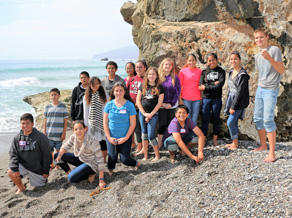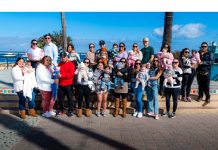The youngsters eagerly hiked nearly three miles roundtrip to Catalina’s Ben Weston Beach, frequently stopping on the trail to ask about plants and bugs and how they fit into the Island’s ecosystem.
The youngsters eagerly hiked nearly three miles roundtrip to Catalina’s Ben Weston Beach, frequently stopping on the trail to ask about plants and bugs and how they fit into the Island’s ecosystem.
They dug through the sand at the beach in search of tiny insects they’d never seen before, and they seriously sniffed a twig of coastal sage to understand why it’s sometimes called “cowboy cologne.” The seventh-grade students from Haskell Middle School in Cerritos spent a day exploring the wonders of Catalina thanks to the Catalina Island Conservancy’s “Course Catalina.” Over the past 19 years, this science-based program has brought classroom lessons to life by giving hundreds of pre-teens an opportunity to spend a day experiencing the Island.
Dr. George Boone, an orthodontist who became a real estate developer and a leading Southern California philanthropist, launched the program. His son, Nick Boone, is the administrator of the Boone Family Foundation and has continued to support Course Catalina.
“I love coming here with them and seeing them experience all that Catalina has to offer – from the boat trip to hiking through the wildlands,” he said. “It’s wonderful to see how Catalina and its beauty can have such a profound effect on them.”
Inspiring a passion for science
The student’s teacher, Elizabeth Ortega, said that “seeing all of this firsthand – nothing can come close to that in helping them understand science. Several of these students have a real passion for science.”
Their passion showed. They peppered the Conservancy’s educational staff with questions about the Island’s plants and animals. They learned about how the Conservancy and its partner, the Institute for Wildlife Studies, worked together to bring the endangered Catalina Island fox back from the brink of extinction. And they hiked to Ben Weston Beach, where they shed their shoes, rolled up their pants and dashed into the surf.
There, they also completed a short class and workbook on Catalina Island’s ecosystem and explored a salt grass and salt bush under a field microscope linked to an iPad. Too soon for the youngsters, the lessons at the beach ended, and they had to hike quickly back to the bus. Joshua Mahar summed up the day for his classmates.
“This is way better than any other field trip I have ever been on,” he said. “You can do way more things out here. It’s just pure nature, and you get to experience it!”
Haskell Middle School students from Cerritos enjoyed an afternoon on Ben Weston Beach during their trip to Catalina Island as part of the Catalina Island Conservancy’s Course Catalina, a science-based program has brought classroom lessons to life by giving hundreds of pre-teens an opportunity to spend a day experiencing the Island. (Photo by Laura Mecoy)
About the Catalina Island Conservancy
Formed in 1972, the Catalina Island Conservancy is one of California’s oldest land trusts. Its mission is to be a responsible steward of its lands through a balance of conservation, education and recreation. Through its ongoing efforts, the Conservancy protects the magnificent natural and cultural heritage of Santa Catalina Island, stewarding approximately 42,000 acres of land and more than 60 miles of rugged shoreline. It provides an airport and 50 miles of biking and nearly 150 miles of hiking opportunities within its road and trail system. The Conservancy conducts educational outreach through two nature centers, its Wrigley Memorial & Botanic Garden and guided experiences in the Island’s rugged interior. Twenty miles from the mainland, the Island is a treasure trove of historical and archaeological sites. It also contains numerous rare and endangered animals and plants. The Island is home to 60 species – and counting – that are found only on Catalina. For additional information, please visit www.catalinaconservancy.org.











